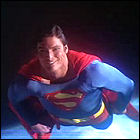 The man who went from an unknown actor to man of steel to activist, Christopher Reeve dies at the age of 52 after falling into a coma a day earlier. He was best known to most as the star of 1978’s Superman and its three sequels, but he also distinguished himself with roles in other films such as Somewhere In Time. He was picky with his roles, turning down the lead parts in such films as The Running Man, Total Recall and American Gigolo. In 1995, he was paralyzed from the neck down after being thrown from a horse, and he took on a new role of a tireless campaigner for spinal injury research (and, more recently, stem cell research). He had recently been seen in the recurring role of the mysterious Dr. Swann in the TV series Smallville.
The man who went from an unknown actor to man of steel to activist, Christopher Reeve dies at the age of 52 after falling into a coma a day earlier. He was best known to most as the star of 1978’s Superman and its three sequels, but he also distinguished himself with roles in other films such as Somewhere In Time. He was picky with his roles, turning down the lead parts in such films as The Running Man, Total Recall and American Gigolo. In 1995, he was paralyzed from the neck down after being thrown from a horse, and he took on a new role of a tireless campaigner for spinal injury research (and, more recently, stem cell research). He had recently been seen in the recurring role of the mysterious Dr. Swann in the TV series Smallville.

 Gil Melle, the composer who created the sound of several seminal ’70s supernatural series, dies at the age of 72. He was responsible for the main title music of such shows as Kolchak: The Night Stalker and Rod Serling’s Night Gallery, as well as scores for individual episodes of shows like Kolchak, Columbo and The Six Million Dollar Man. On the big screen, he created the memorably abstract electronic soundtrack for The Andromeda Strain, and he was also consistently employed to write music for TV movies, including Gene Roddenberry’s pilot movie The Questor Tapes.
Gil Melle, the composer who created the sound of several seminal ’70s supernatural series, dies at the age of 72. He was responsible for the main title music of such shows as Kolchak: The Night Stalker and Rod Serling’s Night Gallery, as well as scores for individual episodes of shows like Kolchak, Columbo and The Six Million Dollar Man. On the big screen, he created the memorably abstract electronic soundtrack for The Andromeda Strain, and he was also consistently employed to write music for TV movies, including Gene Roddenberry’s pilot movie The Questor Tapes.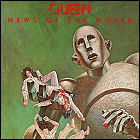 Renowned SF artist (and 11-time Hugo winner) Frank Kelly Freas dies at the age of 82. Perhaps best known to the general public for his painted cover art that adorned Mad Magazine from 1955 through 1962, “Kelly” Freas painted the cover art for such pulp SF magazines as Planet Stories, Science Fiction Quarterly, Weird Tales and especially Analog, to which he contributed cover art many times over five decades. He painted book covers for the works of Arthur C. Clarke, Joe Haldeman, A.E. Van Vogt, Isaac Asimov, Robert Heinlein, Ray Bradbury, Frederik Pohl, Poul Anderson and Ursula Le Guin, among others. He was commissioned by the crew of the first Skylab mission to design their mission patch, and painted the cover of the hit album News Of The World for the rock group Queen.
Renowned SF artist (and 11-time Hugo winner) Frank Kelly Freas dies at the age of 82. Perhaps best known to the general public for his painted cover art that adorned Mad Magazine from 1955 through 1962, “Kelly” Freas painted the cover art for such pulp SF magazines as Planet Stories, Science Fiction Quarterly, Weird Tales and especially Analog, to which he contributed cover art many times over five decades. He painted book covers for the works of Arthur C. Clarke, Joe Haldeman, A.E. Van Vogt, Isaac Asimov, Robert Heinlein, Ray Bradbury, Frederik Pohl, Poul Anderson and Ursula Le Guin, among others. He was commissioned by the crew of the first Skylab mission to design their mission patch, and painted the cover of the hit album News Of The World for the rock group Queen.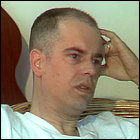 Paul Hester, former drummer for Split Enz and Crowded House, is found dead at the age of 46 in his hometown of Melbourne, Australia. Though police say the death is not “suspicious,” they rule it a suicide. Hester was a mainstay of the Melbourne music scene in the 80s when he auditioned to fill the vacant drum seat in Australian/New Zealand supergroup Split Enz. He joined the group for its 1984 tour, and only recorded one album, 1985’s See Ya Round, in the studio with Split Enz before the band broke up. He joined Neil Finn in a quest to launch a new band which, with the addition of bassist Nick Seymour, was eventually christened Crowded House and scored a #2 on the Billboard charts in early 1987 with “Don’t Dream It’s Over”. He recorded and toured with Crowded House until 1994, when the rigors of touring – and impending fatherhood – convinced him to return to Melbourne with his family.
Paul Hester, former drummer for Split Enz and Crowded House, is found dead at the age of 46 in his hometown of Melbourne, Australia. Though police say the death is not “suspicious,” they rule it a suicide. Hester was a mainstay of the Melbourne music scene in the 80s when he auditioned to fill the vacant drum seat in Australian/New Zealand supergroup Split Enz. He joined the group for its 1984 tour, and only recorded one album, 1985’s See Ya Round, in the studio with Split Enz before the band broke up. He joined Neil Finn in a quest to launch a new band which, with the addition of bassist Nick Seymour, was eventually christened Crowded House and scored a #2 on the Billboard charts in early 1987 with “Don’t Dream It’s Over”. He recorded and toured with Crowded House until 1994, when the rigors of touring – and impending fatherhood – convinced him to return to Melbourne with his family.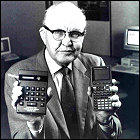 Computer pioneer Jack Kilby, a Nobel Prize winner for his part in creating the integrated cicruit, dies of cancer at the age of 81. A long-time employee of Texas Instruments, he co-invented the integrated circuit, which made the current advances in miniturization of computer technology possible. (Prior to that, even minimal computing power often occupied an entire room.) He also counted the handheld calculator among his inventions. Though he retired from TI in the early 80s, he continued to consult for the company until the time of his death.
Computer pioneer Jack Kilby, a Nobel Prize winner for his part in creating the integrated cicruit, dies of cancer at the age of 81. A long-time employee of Texas Instruments, he co-invented the integrated circuit, which made the current advances in miniturization of computer technology possible. (Prior to that, even minimal computing power often occupied an entire room.) He also counted the handheld calculator among his inventions. Though he retired from TI in the early 80s, he continued to consult for the company until the time of his death. Prolific film and TV composer Joe Harnell, whose memorable themes introduced audiences to such shows as The Incredible Hulk, the original V miniseries and The Bionic Woman, dies of heart failure at the age of 80. Before breaking into film music, he toured America and Europe with the Glenn Miller Air Force Band, and then landed numerous gigs as a musical director for such legendary talents as Frank Sinatra, Peggy Lee, Beverly Sills, Judy Garland, and Lena Horne. He also released over a dozen albums of his own piano compositions. A three-time Emmy nominee for Best Dramatic Score, his atypical choice of a somber solo piano for the main titles of The Incredible Hulk was the beginning of a long partnership with writer/producer Kenneth Johnson, who also utilized his talents in V and Alien Nation, among other shows. He was also a film scoring lecturer and teacher in residence at the University of Southern California.
Prolific film and TV composer Joe Harnell, whose memorable themes introduced audiences to such shows as The Incredible Hulk, the original V miniseries and The Bionic Woman, dies of heart failure at the age of 80. Before breaking into film music, he toured America and Europe with the Glenn Miller Air Force Band, and then landed numerous gigs as a musical director for such legendary talents as Frank Sinatra, Peggy Lee, Beverly Sills, Judy Garland, and Lena Horne. He also released over a dozen albums of his own piano compositions. A three-time Emmy nominee for Best Dramatic Score, his atypical choice of a somber solo piano for the main titles of The Incredible Hulk was the beginning of a long partnership with writer/producer Kenneth Johnson, who also utilized his talents in V and Alien Nation, among other shows. He was also a film scoring lecturer and teacher in residence at the University of Southern California.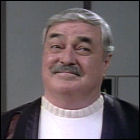 James Doohan, the actor known to millions as the original Star Trek’s Chief Engineer Scott, dies at the age of 85. A veteran TV and radio actor who also led Canadian troops during D-Day in World War II, he tried out a number of accents for what was originally a rather non-specific engineer character for Star Trek’s first season before settling on a Scottish accent; even after the series ended, his involvement with Star Trek continued, and he provided nearly every male voice outside of the show’s regular characters in the short-lived animated Star Trek series before reprising the role of Scotty in the first seven Star Trek films and a fan-favorite episode of Star Trek: The Next Generation. He was diagnosed with Alzheimer’s Disease last year, and made a farewell appearance at Star Trek convention a few months later, and received a star on the Hollywood Walk of Fame as well.
James Doohan, the actor known to millions as the original Star Trek’s Chief Engineer Scott, dies at the age of 85. A veteran TV and radio actor who also led Canadian troops during D-Day in World War II, he tried out a number of accents for what was originally a rather non-specific engineer character for Star Trek’s first season before settling on a Scottish accent; even after the series ended, his involvement with Star Trek continued, and he provided nearly every male voice outside of the show’s regular characters in the short-lived animated Star Trek series before reprising the role of Scotty in the first seven Star Trek films and a fan-favorite episode of Star Trek: The Next Generation. He was diagnosed with Alzheimer’s Disease last year, and made a farewell appearance at Star Trek convention a few months later, and received a star on the Hollywood Walk of Fame as well.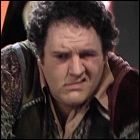 British actor and music hall performer David Jackson, best known to genre fans as Gan from
British actor and music hall performer David Jackson, best known to genre fans as Gan from 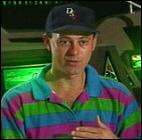 Television writer and producer Michael Piller, credited by many for the success of the revived Star Trek franchise (and co-creator of spinoff series Star Trek: Deep Space Nine and Star Trek: Voyager) dies at the age of 57 after a prolonged battle with cancer. Piller, who had previously been a producer on Simon & Simon and the SF series Probe, joined Star Trek: The Next Generation as the head of the writing staff for the third season in 1990, replacing Maurice Hurley. Piller was generally credited with bringing a more friendly vibe to the show’s writing sessions and with finding new talent, such as fan writer Ronald D. Moore. Piller also wrote the popular two-part episode The Best Of Both Worlds and many others, and went on to create Deep Space Nine with Rick Berman and Voyager with Berman and fellow Next Generation veteran Jeri Taylor. Piller created the short-lived series Legend for UPN, starring Richard Dean Anderson (pre-SG-1) and John de Lancie, and later formed a production company with his son Shawn, where he developed the recent version of The Dead Zone for TV, as well as ABC Family Channel’s Wildfire, starring DS9 alumnus Nana Visitor.
Television writer and producer Michael Piller, credited by many for the success of the revived Star Trek franchise (and co-creator of spinoff series Star Trek: Deep Space Nine and Star Trek: Voyager) dies at the age of 57 after a prolonged battle with cancer. Piller, who had previously been a producer on Simon & Simon and the SF series Probe, joined Star Trek: The Next Generation as the head of the writing staff for the third season in 1990, replacing Maurice Hurley. Piller was generally credited with bringing a more friendly vibe to the show’s writing sessions and with finding new talent, such as fan writer Ronald D. Moore. Piller also wrote the popular two-part episode The Best Of Both Worlds and many others, and went on to create Deep Space Nine with Rick Berman and Voyager with Berman and fellow Next Generation veteran Jeri Taylor. Piller created the short-lived series Legend for UPN, starring Richard Dean Anderson (pre-SG-1) and John de Lancie, and later formed a production company with his son Shawn, where he developed the recent version of The Dead Zone for TV, as well as ABC Family Channel’s Wildfire, starring DS9 alumnus Nana Visitor. A self-taught composer whose scores for the original Toho Studios Godzilla films have become cult favorites, Akira Ifukube dies at the age of 91. He trained in the lumber industry and served as a forestry office during World War II, but he explored his interest in music in his spare time and became a university music instructor in 1946. In 1954, he scored the first Godzilla movie, and that music was tracked into later films in the series and has been re-recorded, covered and sampled by numerous artists since then. Aside from his film scoring work, he has been credited with hundreds of musical compositions since then and served as president of the Tokyo College of Music from 1976 to 1987.
A self-taught composer whose scores for the original Toho Studios Godzilla films have become cult favorites, Akira Ifukube dies at the age of 91. He trained in the lumber industry and served as a forestry office during World War II, but he explored his interest in music in his spare time and became a university music instructor in 1946. In 1954, he scored the first Godzilla movie, and that music was tracked into later films in the series and has been re-recorded, covered and sampled by numerous artists since then. Aside from his film scoring work, he has been credited with hundreds of musical compositions since then and served as president of the Tokyo College of Music from 1976 to 1987.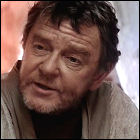 Actor Phil Brown, who secured a permanent place in SF lore with the role of Uncle Owen in Star Wars, dies at the age of 89. After spending the early years of his career working in stage productions in New York, he moved to Hollywood and co-founded the Actors’ Laboratory. He was only one film into a directing career when he was blacklisted during the McCarthy hearings, and left America to work in London in 1952 as both an actor and director, not to move back to the US until 1993. He found that his Star Wars role, even as brief as it was, won him a place of honor at many SF conventions, and he spent recent years making the rounds and meeting his fans. He also appeared in Superman, The Pink Panther Strikes Again, Twilight’s Last Gleaming, the TV miniseries The Martian Chronicles, and played a brief part in a trailer assembled by Richard Hatch to pitch a revival of the original Battlestar Galactica series.
Actor Phil Brown, who secured a permanent place in SF lore with the role of Uncle Owen in Star Wars, dies at the age of 89. After spending the early years of his career working in stage productions in New York, he moved to Hollywood and co-founded the Actors’ Laboratory. He was only one film into a directing career when he was blacklisted during the McCarthy hearings, and left America to work in London in 1952 as both an actor and director, not to move back to the US until 1993. He found that his Star Wars role, even as brief as it was, won him a place of honor at many SF conventions, and he spent recent years making the rounds and meeting his fans. He also appeared in Superman, The Pink Panther Strikes Again, Twilight’s Last Gleaming, the TV miniseries The Martian Chronicles, and played a brief part in a trailer assembled by Richard Hatch to pitch a revival of the original Battlestar Galactica series.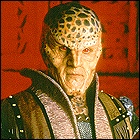 Actor Andreas Katsulas, known to SF fans as Babylon 5′s eloquent Ambassador G’Kar, dies of lung cancer at the age of 59. After making a mark with Star Trek fans as Next Generation’s feisty recurring Romulan, Commander Tomalok, he landed the part of Babylon 5′s resident Narn ambassador and stayed with it from the 1993 pilot movie through the most recent Babylon 5 project to date, the 2002 TV movie Legend Of The Rangers. He also made appearances in Max Headroom, Alien Nation, Star Trek: Enterprise, Millennium, NYPD Blue, and movies such as the big-screen adaptation of The Fugitive.
Actor Andreas Katsulas, known to SF fans as Babylon 5′s eloquent Ambassador G’Kar, dies of lung cancer at the age of 59. After making a mark with Star Trek fans as Next Generation’s feisty recurring Romulan, Commander Tomalok, he landed the part of Babylon 5′s resident Narn ambassador and stayed with it from the 1993 pilot movie through the most recent Babylon 5 project to date, the 2002 TV movie Legend Of The Rangers. He also made appearances in Max Headroom, Alien Nation, Star Trek: Enterprise, Millennium, NYPD Blue, and movies such as the big-screen adaptation of The Fugitive.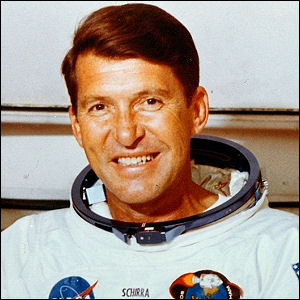 Astronaut Wally Schirra, one of the seven original Mercury astronauts, and the only astronaut to lift off aboard Mercury, Gemini and Apollo missions, dies at the age of 84. Selected as one of the first “class” of American astronauts, Schirra was the fifth American to fly in space, making six orbits of the Earth in 1962. He commanded Gemini 6, and was the commander of Apollo 7, the first manned Apollo mission, which tested the capabilities of the redesigned Apollo command/service module in Earth orbit. In 1969, he retired from NASA and immediately landed a new gig, sitting aside TV news legend Walter Cronkite for coverage of the missions to the moon, as well as continuing to offer insider commentary on space coverage at CBS through 1975. He was awarded numerous medals by both NASA and the United States Navy, among countless other honors.
Astronaut Wally Schirra, one of the seven original Mercury astronauts, and the only astronaut to lift off aboard Mercury, Gemini and Apollo missions, dies at the age of 84. Selected as one of the first “class” of American astronauts, Schirra was the fifth American to fly in space, making six orbits of the Earth in 1962. He commanded Gemini 6, and was the commander of Apollo 7, the first manned Apollo mission, which tested the capabilities of the redesigned Apollo command/service module in Earth orbit. In 1969, he retired from NASA and immediately landed a new gig, sitting aside TV news legend Walter Cronkite for coverage of the missions to the moon, as well as continuing to offer insider commentary on space coverage at CBS through 1975. He was awarded numerous medals by both NASA and the United States Navy, among countless other honors.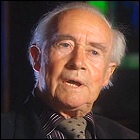 Actor Peter Tuddenham, perhaps not been a familiar face to fans of British SF, but certainly a familiar voice, dies at the age of 88. After playing voice-over-only characters in a few episodes of Doctor Who, he became a series regular on the cult favorite series Blake’s 7, providing the voice of the Liberator’s on-board computer Zen and later the feisty supercomputer Orac throughout the series. (When the Liberator was destroyed at the end of the show’s third season, he voiced its replacement, the obsequious Slave, aboard the crew’s new ship.) He did play numerous characters in person in guest appearances on many shows, and also served as a dialect coach for other actors throughout much of his career.
Actor Peter Tuddenham, perhaps not been a familiar face to fans of British SF, but certainly a familiar voice, dies at the age of 88. After playing voice-over-only characters in a few episodes of Doctor Who, he became a series regular on the cult favorite series Blake’s 7, providing the voice of the Liberator’s on-board computer Zen and later the feisty supercomputer Orac throughout the series. (When the Liberator was destroyed at the end of the show’s third season, he voiced its replacement, the obsequious Slave, aboard the crew’s new ship.) He did play numerous characters in person in guest appearances on many shows, and also served as a dialect coach for other actors throughout much of his career.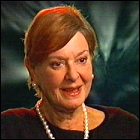 Verity Lambert, the original producer of Doctor Who when it launched in 1963, dies at the age of 71. When she took the reins of the still-in-development series, she was 28, the youngest BBC producer at that time, and the only female producer at the BBC at the time. Though she frequently butted heads with Doctor Who creator Sydney Newman, including commissioning the first Dalek story over his objections that the show should feature “no bug-eyed monsters,” he ultimately relented and gave her free rein. She remained with the series for a year and a half, going on to produce a string of other shows, including Adam Adamant Lives!, John Cleese’s Clockwise series, and Jonathan Creek. Following stints at the BBC, Thames Television and EMI, she founded her own production company, Cinema Verity, which at various points was again attached to Doctor Who during the abortive attempts to turn the series into a film franchise in the 1980s and early ’90s.
Verity Lambert, the original producer of Doctor Who when it launched in 1963, dies at the age of 71. When she took the reins of the still-in-development series, she was 28, the youngest BBC producer at that time, and the only female producer at the BBC at the time. Though she frequently butted heads with Doctor Who creator Sydney Newman, including commissioning the first Dalek story over his objections that the show should feature “no bug-eyed monsters,” he ultimately relented and gave her free rein. She remained with the series for a year and a half, going on to produce a string of other shows, including Adam Adamant Lives!, John Cleese’s Clockwise series, and Jonathan Creek. Following stints at the BBC, Thames Television and EMI, she founded her own production company, Cinema Verity, which at various points was again attached to Doctor Who during the abortive attempts to turn the series into a film franchise in the 1980s and early ’90s.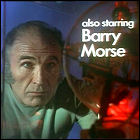 Best known to mainstream audiences as the Lt. Gerard, the relentless cop pursuing The Fugitive in the 1960s, actor Barry Morse dies at the age of 89. London-born, he relocated to Canada in the 1950s, but landed many a part in U.S.-based productions. In SF circles, he remains best remembered for his one-season stint as the unflappable Professor Bergman on Space: 1999, and as a member of the international all-star cast of the 1980 BBC/NBC miniseries rendition of Ray Bradbury’s The Martian Chronicles. He was instrumental in turning around the fortunes of Ontario’s Shaw Theatre Festival in the 1960s and ’70s, a task he took on out of his personal love of the works of playwright George Bernard Shaw.
Best known to mainstream audiences as the Lt. Gerard, the relentless cop pursuing The Fugitive in the 1960s, actor Barry Morse dies at the age of 89. London-born, he relocated to Canada in the 1950s, but landed many a part in U.S.-based productions. In SF circles, he remains best remembered for his one-season stint as the unflappable Professor Bergman on Space: 1999, and as a member of the international all-star cast of the 1980 BBC/NBC miniseries rendition of Ray Bradbury’s The Martian Chronicles. He was instrumental in turning around the fortunes of Ontario’s Shaw Theatre Festival in the 1960s and ’70s, a task he took on out of his personal love of the works of playwright George Bernard Shaw.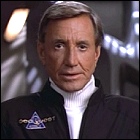 Actor Roy Scheider, best known for his portrayal of Chief Brody in the 1975 megahit Jaws and its 1978 sequel, dies at the age of 75. Well-known for his mainstream roles, he also starred in some fondly-remembered genre projects, including the movies Blue Thunder and 2010: The Year We Make Contact, and a two-year stint as Captain Nathan Bridger on seaQuest DSV. He was twice nominated for an Oscar, for The French Connection and All That Jazz.
Actor Roy Scheider, best known for his portrayal of Chief Brody in the 1975 megahit Jaws and its 1978 sequel, dies at the age of 75. Well-known for his mainstream roles, he also starred in some fondly-remembered genre projects, including the movies Blue Thunder and 2010: The Year We Make Contact, and a two-year stint as Captain Nathan Bridger on seaQuest DSV. He was twice nominated for an Oscar, for The French Connection and All That Jazz. 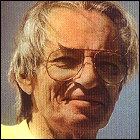 Oscar-winning Film and TV composer Leonard Rosenman dies at the age of 83. Known for such movie scores as East Of Eden and Rebel Without A Cause (both starring James Dean), he also created the music for pivotal SF movies such as Fantastic Voyage, Star Trek IV: The Voyage Home, Ralph Bakshi’s animated rendition of Lord Of The Rings, Beneath The Planet Of The Apes and Battle For The Planet Of The Apes. He also scored episodes of TV’s original Twilight Zone, Amazing Stories and The Alfred Hitchcock Hour, among a great many others, including National Geographic and Jacques Cousteau specials.
Oscar-winning Film and TV composer Leonard Rosenman dies at the age of 83. Known for such movie scores as East Of Eden and Rebel Without A Cause (both starring James Dean), he also created the music for pivotal SF movies such as Fantastic Voyage, Star Trek IV: The Voyage Home, Ralph Bakshi’s animated rendition of Lord Of The Rings, Beneath The Planet Of The Apes and Battle For The Planet Of The Apes. He also scored episodes of TV’s original Twilight Zone, Amazing Stories and The Alfred Hitchcock Hour, among a great many others, including National Geographic and Jacques Cousteau specials.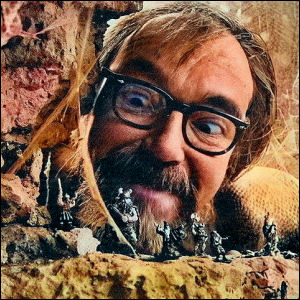 The co-creator of the seminal “paper-and-dice” role playing game Dungeons & Dragons dies at the age of 69. Gary Gygax helped to devise the D&D system with Dave Arneson in 1974, and the game instantly took off, with players adoring its simultaneous escapism and complexity, and parents – usually having heard horror stories of a few bad apples – protesting the game vigorously. D&D created its own little empire for publisher TSR Inc., and numerous add-ons and imitations followed (including virtually the entire metal miniature gaming industry), influenced video and computer games, and inspired an animated series (whose production he was involved in) and movies. He still received – and enjoyed – fan mail from avid D&D players past and present.
The co-creator of the seminal “paper-and-dice” role playing game Dungeons & Dragons dies at the age of 69. Gary Gygax helped to devise the D&D system with Dave Arneson in 1974, and the game instantly took off, with players adoring its simultaneous escapism and complexity, and parents – usually having heard horror stories of a few bad apples – protesting the game vigorously. D&D created its own little empire for publisher TSR Inc., and numerous add-ons and imitations followed (including virtually the entire metal miniature gaming industry), influenced video and computer games, and inspired an animated series (whose production he was involved in) and movies. He still received – and enjoyed – fan mail from avid D&D players past and present. Science fiction writer, science essayist and all-around futuristic thinker Sir Arthur C. Clarke dies at the age of 90. In addition to writing such seminal SF novels as “2001: a space odyssey” (and simultaneously writing its screenplay) and “Rendezvous With Rama” (and their various sequels and spinoffs), he also posited – in a 1945 paper – a network of communications in fixed orbits above the Earth, exchanging signals between the ground and one another, some 20 years before the first steps were taken in that direction. (As a result, geosynchronous orbit is also referred to as “Clarke orbit.”) Even before that, he played a part in early work on radar as a member of the RAF during World War II. In the 1950s, he moved to Sri Lanka, but kept up a prodigious schedule of writing both fiction and non-fiction, as well as appearances ranging from brief movie roles (both as himself and otherwise) to being a television commentator on the Apollo moon missions.
Science fiction writer, science essayist and all-around futuristic thinker Sir Arthur C. Clarke dies at the age of 90. In addition to writing such seminal SF novels as “2001: a space odyssey” (and simultaneously writing its screenplay) and “Rendezvous With Rama” (and their various sequels and spinoffs), he also posited – in a 1945 paper – a network of communications in fixed orbits above the Earth, exchanging signals between the ground and one another, some 20 years before the first steps were taken in that direction. (As a result, geosynchronous orbit is also referred to as “Clarke orbit.”) Even before that, he played a part in early work on radar as a member of the RAF during World War II. In the 1950s, he moved to Sri Lanka, but kept up a prodigious schedule of writing both fiction and non-fiction, as well as appearances ranging from brief movie roles (both as himself and otherwise) to being a television commentator on the Apollo moon missions. Space: 1999 and Doctor Who scriptwriter Johnny Byrne dies at the age of 73. One of the most prolific
Space: 1999 and Doctor Who scriptwriter Johnny Byrne dies at the age of 73. One of the most prolific 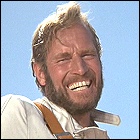 Oscar-winning actor Charlton Heston dies at the age of 84. Renowned for a string of tough-guy roles in major big-screen epics that earned him an Academy Award for best actor in 1959’s Ben-Hur, Heston appeared in other blockbusters such as El Cid and The Ten Commandments; genre fans may know him best for two SF films, Soylent Green and the 1968 smash hit Planet Of The Apes. His outspoken political views were on display as much as his acting skills, ranging from marching to Washington with Dr. Martin Luther King Jr. to serving as president of the National Rifle Association. He had also served as a past president of the Screen Actors’ Guild.
Oscar-winning actor Charlton Heston dies at the age of 84. Renowned for a string of tough-guy roles in major big-screen epics that earned him an Academy Award for best actor in 1959’s Ben-Hur, Heston appeared in other blockbusters such as El Cid and The Ten Commandments; genre fans may know him best for two SF films, Soylent Green and the 1968 smash hit Planet Of The Apes. His outspoken political views were on display as much as his acting skills, ranging from marching to Washington with Dr. Martin Luther King Jr. to serving as president of the National Rifle Association. He had also served as a past president of the Screen Actors’ Guild.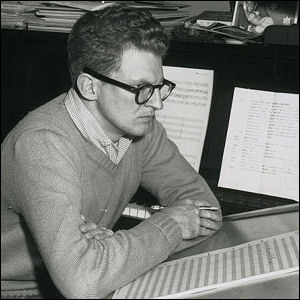 Composer, arranger and orchestrator
Composer, arranger and orchestrator 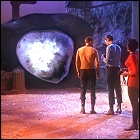 Director and former actor Joseph Pevney, the man behind the camera for many of the original
Director and former actor Joseph Pevney, the man behind the camera for many of the original 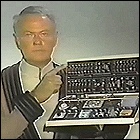 Comedy great Harvey Korman, known for his long run on the Carol Burnett Show and Blazing Saddles, dies at the age of 81. Along with Tim Conway, he was a staple of Burnett’s comedy sketch show, though an attempt to spin that success off into his own series ran aground in 1977. A year later, still a comedy fixture, he racked up his most infamous genre credit: appearing as multiple characters in the almost-trippy
Comedy great Harvey Korman, known for his long run on the Carol Burnett Show and Blazing Saddles, dies at the age of 81. Along with Tim Conway, he was a staple of Burnett’s comedy sketch show, though an attempt to spin that success off into his own series ran aground in 1977. A year later, still a comedy fixture, he racked up his most infamous genre credit: appearing as multiple characters in the almost-trippy 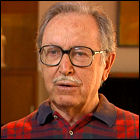 Robert Justman, who along with Gene Roddenberry shepherded the original
Robert Justman, who along with Gene Roddenberry shepherded the original 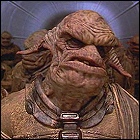 Longtime special effects and makeup wizard Stan Winston, a four-time Oscar winner with a resume loaded with some of the most influential genre films in movie history, dies at the age of 62 after struggling for seven years with multiple myeloma. His four Oscar wins – two for Terminator 2, one for Jurassic Park, and one for Aliens – are just the tip of the iceberg; his makeup and effects skills also earned him Oscar nominations for such films as Edward Scissorhands, Batman Returns, and AI. Other movie credits included The Wiz, Predator, Friday The 13th Part III, The Thing, Interview With The Vampire and – most recently – Iron Man. His early career was spent in TV, with work on Roots, Amazing Stories and even creating the costumes for Chewbacca’s family in the
Longtime special effects and makeup wizard Stan Winston, a four-time Oscar winner with a resume loaded with some of the most influential genre films in movie history, dies at the age of 62 after struggling for seven years with multiple myeloma. His four Oscar wins – two for Terminator 2, one for Jurassic Park, and one for Aliens – are just the tip of the iceberg; his makeup and effects skills also earned him Oscar nominations for such films as Edward Scissorhands, Batman Returns, and AI. Other movie credits included The Wiz, Predator, Friday The 13th Part III, The Thing, Interview With The Vampire and – most recently – Iron Man. His early career was spent in TV, with work on Roots, Amazing Stories and even creating the costumes for Chewbacca’s family in the 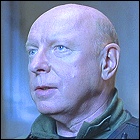 Actor Don S. Davis, best known for his long stint in the role of General George Hammond on
Actor Don S. Davis, best known for his long stint in the role of General George Hammond on 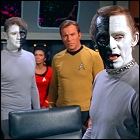 Director Jud Taylor, best known to genre fans for helming several third season episodes of the original Star Trek, dies at the age of 76. In addition to his directing duties, he served as vice president of the Directors’ Guild of America from 1977 to 1981, and then served a term as the body’s president until 1983; the years he spent advocating the cause of film and television directors are considered among the most influential in the DGA’s history, during which he helped open doors for both female and minority directors, and had a tremendous effect on directors’ creative rights, pensions, and pay. He was active behind the camera as recently as the 2000s, during which he directed several episodes of Law & Order: SVU.
Director Jud Taylor, best known to genre fans for helming several third season episodes of the original Star Trek, dies at the age of 76. In addition to his directing duties, he served as vice president of the Directors’ Guild of America from 1977 to 1981, and then served a term as the body’s president until 1983; the years he spent advocating the cause of film and television directors are considered among the most influential in the DGA’s history, during which he helped open doors for both female and minority directors, and had a tremendous effect on directors’ creative rights, pensions, and pay. He was active behind the camera as recently as the 2000s, during which he directed several episodes of Law & Order: SVU.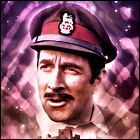 Forever known as the Brigadier (and thus the only ranking UNIT officer who counts), actor Nicholas Courtney dies at the age of 81, the only actor to have appeared alongside every Doctor in Doctor Who. After appearing as a one-off guest character in the Hartnell era, Courtney is drafted into the role of Colonel Lethbridge Stewart for a 1968 Doctor Who story, proving popular enough to return the following season with a promotion to Brigadier. In this role, Courtney guest starred with every television Doctor (including, thanks to a cameo in a 1993 charity skit, Colin Baker); he would also appear alonside Paul McGann in a Big Finish audio play, a medium that also saw him appearing with David Tennant, years before being cast as the tenth Doctor. Courtney would play the role for Big Finish several times, and even reprised the Brigadier in a 1995 fan-made video production, before bringing the character back in a two-part episode of The Sarah Jane Adventures.
Forever known as the Brigadier (and thus the only ranking UNIT officer who counts), actor Nicholas Courtney dies at the age of 81, the only actor to have appeared alongside every Doctor in Doctor Who. After appearing as a one-off guest character in the Hartnell era, Courtney is drafted into the role of Colonel Lethbridge Stewart for a 1968 Doctor Who story, proving popular enough to return the following season with a promotion to Brigadier. In this role, Courtney guest starred with every television Doctor (including, thanks to a cameo in a 1993 charity skit, Colin Baker); he would also appear alonside Paul McGann in a Big Finish audio play, a medium that also saw him appearing with David Tennant, years before being cast as the tenth Doctor. Courtney would play the role for Big Finish several times, and even reprised the Brigadier in a 1995 fan-made video production, before bringing the character back in a two-part episode of The Sarah Jane Adventures.